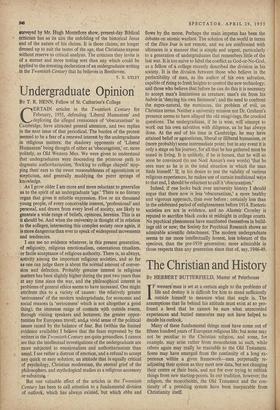Hamilton, at 15s. ' • This year marks the centenary
of the death of Charlotte BronW, and it is presumably a revived or increasing interest in the Brontës generally which has led to the almost simultaneous appearance of three new editions or impressions of Emily Bronte's Wuthering Heights. The Everyman edition, with an introduction by Margaret Lane, is reissued at 6s. The book also appears in Blackie's 'Library of Famous Books' at 4s. 6d. Finally, Macdonald's are producing it in their 'Illustrated Classics,' with an introduction by Daphne du Maurier, and agreeable illustrations by Werner Stein, at 10s. 6d. This last edition (which follows the first edition of 1847 and not the 1850 edition cbrrccted by Charlotte) is the best printed of the three, and would be an agreeable production if it were not bound in a kind of American cloth which is, in my view, out of keeping with modern taste.
Chatto and Windus have added Pylon (8s. 6d.) to their uniform
edition of the works of William Faulkner. NICHOLAS RAEBURN
New Novels
Most Likely to Succeed. By John Dos Passos. (Hale, 10s. 6d.) Stranger Come Home. By William L. Shirer. (Hale, 12s. 6d.) Troubling of a Star. By Walt Sheldon. (MacGibbon and Kee, 12s, 6d.)
THREE novels about the contemporary world, with large 'external'
themes war, tyranny, injustice, treachery, politics — make personal relations look small and glum in a corner.
John Dos Passos starts off Most Likely to Succeed with such exuberance it carries him through a good deal of sticky stuff to follow. Babbling in epigrammatic monologue a picaresque account of his latest adventures to his latest millionairess is Jed, the best
• No Flies in China
G. S. GALE. A vivid account of the recent Labour delegation to China. "The best reporters' book for many a long day . . . a brilliant travel book with caustic political asides."—Speciator. 15s.
Science Makes Sense
RITCHIE CALDER. Britain's leading scientific writer presents in lively fashion the great scientific advances of today from the use of atomic energy to space travel. Written with freshness and humour, and without technicalities, it tells the general reader all that he ought
to know about science. 12s. 6d.
History of Industrial Life Assurance
' DERMOT MOR RAH. An attempt by a layman to explain to other laymen the purposes and processes of industrial assurance, an institution which exercises a far-reaching influence upon the lite of the community. I Ss.
God and Man in the Old Testament
LEON ROTH. In. some 500 passages this Biblical anthology attempts to bring together in their original wording the highest expression of the Biblical way of life with its hopes and obligations. 10s. 6d.
ALLEN & UNWIN, 40 Museum Street, London, W.C.I wonder-boy, the most appalling literary jeune premier I remember meeting in fiction and hope never to meet in fact : the brilliant bore who tells you, 'I dined out for weeks on that one.' For the first chapter there is Jed, just Jed, holding the stage as he always would in life and undisturbed by anything outside the business in hand (the millionairess). But Mr. Dos Passos, haunted by the need to examine, as well as the small soul of Jed, the large soul of America, has to hang his hero twice over, once with his own nature (as cut out for the gallows as any you could think of), and once, to be contemporary about it, with another old rope called Communism.
Now the point about Jed is that he is just the sort of man who would never commit himself to anything. While fellow-travelling was in vogue, he might have fellow-travelled, but since he knows, exquisitely and revoltingly, what side his bread is buttered, he would never have compromised himself with the Party enough to make life uncomfortable later on. Egocentric, neurotic, he is the intuitive trimmer who judges the moment, the advantage, just the current voice and manner with all the fervour of his slithery soul. It is a measure of his reality that his Communism rings so false. It is like saying with absolute certainty of someone you know ; 'But he couldn't have done that.' Because Communism is the fashionable bogey, Mr. Dos Passos seems to be pinning it about indiscriminately; all men may he sinners, but not all sins may suit them. So that his book, which began with such rightness and exactness of observation, such a firework prose, beautifully spluttering and shimmering, like Jed himself, declines into an ordinary tale of sorry success-and-failure, of Hollywood, Green- wich Village, transatlantic liners, wives and ex-wives and the rest of it.
Ironical, beside the guilty red, is the innocent, indeed virtuous, pink of Stranger Come Home. Mr. Shirer has no difficulty in apportioning guilt: his hero is a straightforward case of the Europeanised American, the Jamesian returned to find, not the America he remembered, but one dominated by a witch-hunting Senator O'Brien. The plot is so ready-made that we seem to have read it all in the newspapers, and though you might argue that last year's news is like yesterday's pudding, and rather unappetis- ing, there is also, once you get into it, a good deal to be said for seeing the McCarthy tribunal in action again, word for word; for feeling, as so many felt then, 'But this is absurd,' and then remembering that in fact it all happened.


















































 Previous page
Previous page